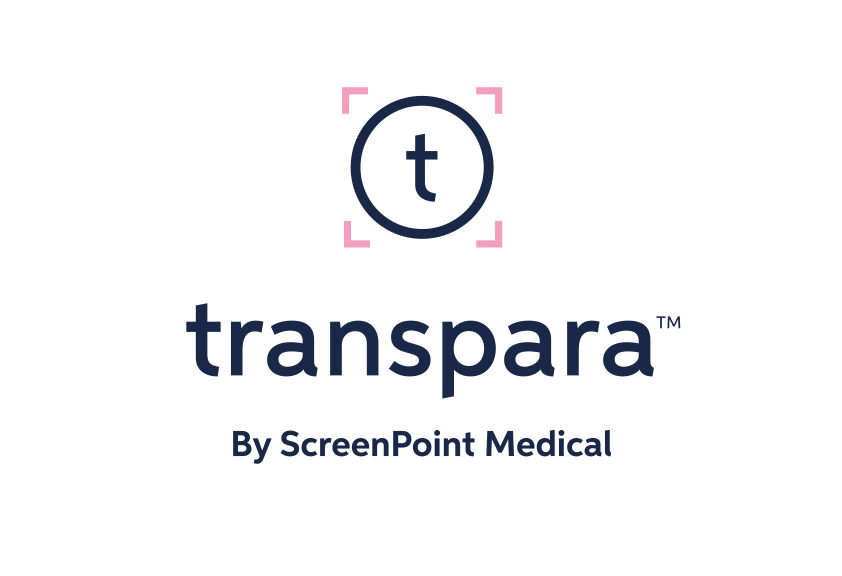
Transpara by ScreenPoint Medical evidence based multivendor breast AI, now in use in 15 countries
Independent peer reviewed publications have already shown that Transpara performs as well as a Radiologist(1,2), helps to improve accuracy(1) and has the potential to reduce workload(3)
LONDON (PRWEB)
January 03, 2020
ScreenPoint Medical’s Scientists who developed the Transpara AI decision support system which helps radiologists to identify potential breast cancers earlier and faster, say a new international study by Google Health and Imperial College, London, supports the findings of radiologists already using the Transpara system in 15 countries, including Hungary, Turkey, the USA and France.
The new study, published in the journal Nature, showed that AI could perform at least as well or better than specialist breast radiologists.
The incidence of breast cancer is increasing worldwide due to environmental, diet and lifestyle changes but increasingly, countries are reporting a shortage of radiologists. In the UK and some other countries, every mammogram is read by two specialist radiologists. However, this is expensive and elsewhere often radiologists work alone. In the US for example, 60% of radiologists reading mammograms are general radiologists.
It is believed that overall up to 25% of breast cancers are missed but the earlier a cancer is discovered and the earlier a patient can be treated, the greater the chance that she will survive the cancer.
“As academics we set out to try and reduce the death toll from breast cancer, to help radiologists work more efficiently and also to reduce the number of women who were being needlessly recalled for often invasive and painful treatments,” said Professor Prof Nico Karssemeijer CEO and co-founder of ScreenPoint Medical, the company that produces the Transpara system.
Transpara, which is compatible with the major manufacturer’s mammography and PACS systems, is trained on over 1 million images from over 10 countries and 20 respected institutions. “Apart from published research, we have real time evidence, clinical experience of radiologists across Europe and elsewhere, that Transpara is improving their effectiveness. From the studies, using Transpara concurrently is shown to improve the performance of radiologists irrespective of their experience. The system’s unique Exam Score means women at higher risk of breast cancer can be immediately prioritised for recall and those with a low score can have their minds put at rest much faster. Independent peer reviewed publications have already shown that Transpara performs as well as a Radiologist(1,2), helps to improve accuracy(1) and has the potential to reduce workload(3).”
Professor Sir Michael Brady from Oxford, and also co-founder of ScreenPoint, said all women should be able to access the same high levels of care. “Transpara can remove the chance of a ‘postcode lottery’ where standards of care vary widely.”
In the UK, Transpara is being assessed in several locations but radiologists in Europe, who have been using the system for some time, say Transpara has brought major benefits to their breast care practices.
“If Transpara marks something that is visible, I can check it immediately with ultrasound to become more certain about the need for biopsy. As a decision support tool, Transpara increases your confidence and saves time too, enabling our patients to learn the results of their scans faster than before,” says Professor Levent Celik, Principal of Radiologica in Istanbul who uses Transpara in daily practice.
Dr Hajer Jerraya, Associate Radiologist at the Artois Radiologie in Arras, France says, “I can no longer work without Transpara. The tool is very good at detection and increases my diagnostic confidence.”
The final word from ScreenPoint co-founder Professor Sir Michael Brady in Oxford: “Women everywhere should have the same quality of care – the best that’s available. We are a company dedicated to addressing the needs of women regarding breast care and we are going to continue to work to help reduce the terrible toll from breast cancer!”
1. Rodríguez-Ruiz A, Krupinski E, Mordang J-J, Schilling K, Heywang-Köbrunner SH, Sechopoulos I, et al. “Detection of Breast Cancer with Mammography: Effect of an Artificial Intelligence Support System”. Radiology (2018)
2. Rodriguez-Ruiz A, Lång K, Gubern-Merida A, Broeders M, Gennaro G, Clauser P, et al. “Stand-Alone Artificial Intelligence for Breast Cancer Detection in Mammography: Comparison With 101 Radiologists” JNCI (2019)
3. Rodriguez-Ruiz A, Lång K, Gubern-Merida A, Teuwen J, Mireille Broeders, et al. “Can we reduce the workload of mammographic screening by automatic identification of normal exams with artificial intelligence? A feasibility study”. European Radiology (2019)
Share article on social media or email:

